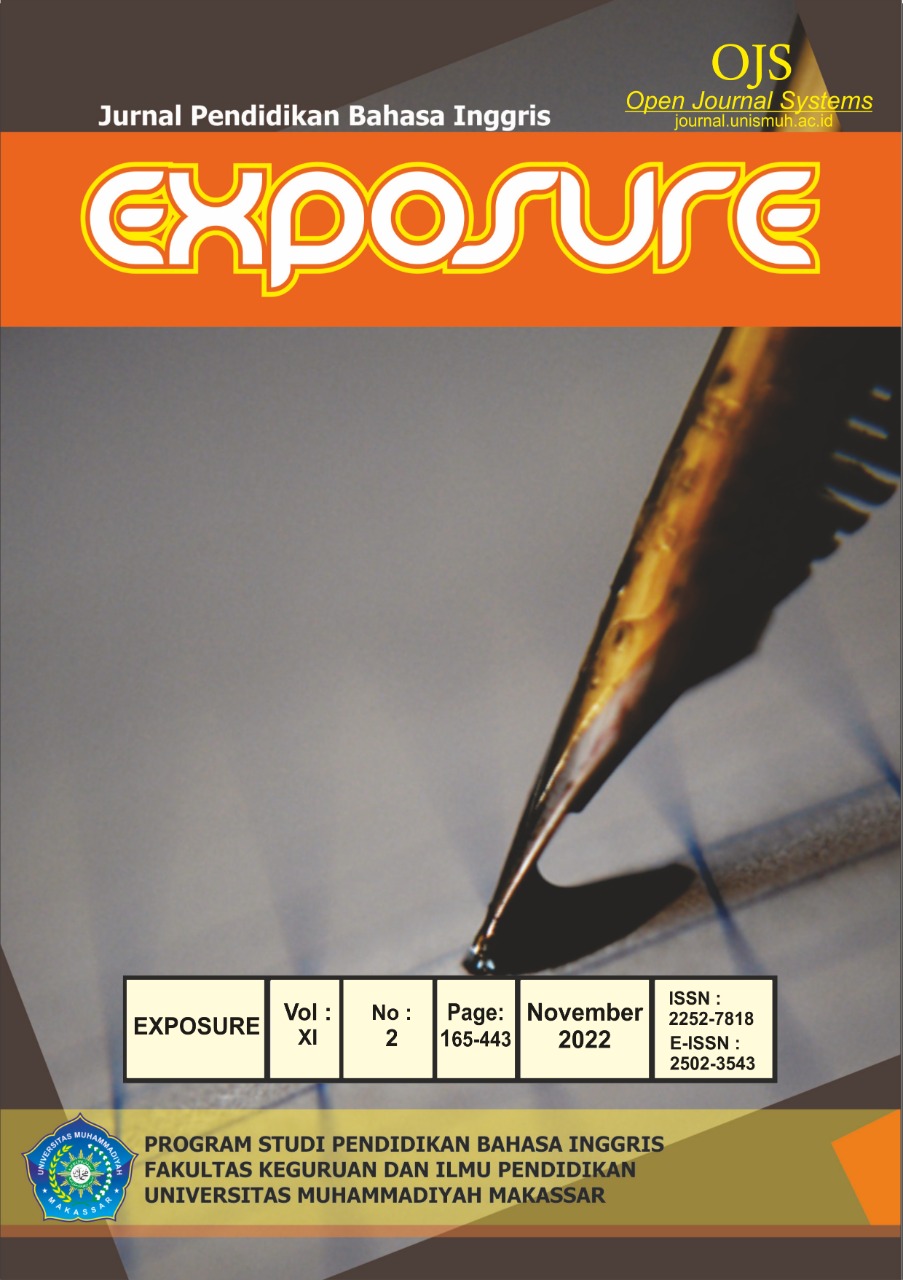STUDENTS’ PROBLEMS AND MOTIVATIONS TO CONTINUING STUDY AT THE ENGLISH EDUCATION OF MAGISTER PROGRAM IN MAKASSAR
DOI:
https://doi.org/10.26618/exposure.v11i2.9321Keywords:
Students’ Problem, Students’ Motivation, English EducationAbstract
This research aims to find out the problems and also the motivations of students experience or face when they want to continue their studies in the English education of magister program at the State University of Makassar. In this study, the researchers used a method in which the method was a descriptive qualitative method. Meanwhile, the researchers conducted this research in the English Education magister program at the State University of Makassar. Then the respondents in this study totaled 30 students, they were students in the fourth semester English education program. The data in this study were taken directly from the sample by the researchers using several questions where the questions were open-ended questions given by the researchers to the respondent. Then the data were transcribed and analyzed by the researchers.The findings in this study were based on research problems students’ problems and motivations to continue studying at the English education of master program at the State University of Makassar, namely 1) The researchers found that there were six problems faced by students while they were learning English of magister program in State University of Makassar. The problems were: 1. The problem of student academics, 2. Student administrative problems, 3. Student problems with their lecturers, 4. Student financial problems, 5. Student time management problems, and also 6. Student facility problems, 2) the researchers also found 5 types of motivational backgrounds of students in continuing their studies in the English education of the magister program, and the types were: 1. Student quality motivation, 2. Student career motivation, 3. Student economic motivation, 4. Student social motivation and finally 5. Motivation is based on their family.References
A.M. Sardiman. 2005. Interaksi dan Motivasi Belajar Mengajar. Jakarta: Rajawali Press.
Deci, E. L., & Ryan, R. M. (1985). Intrinsic motivation and self-determination in human behavior. New York: Pl
Gardner, R (1985) Social Phsychology and Second Language Learning. The Role of attitudes and Motivation. London
Gawel, J. E. (2008). Herzberg’s Theory of Motivation and Maslow’s Hierarchy of Needs, ERICDigest. Retrieved October 6, 2017, from: http://www.ericdigests.org/1999-1/needs.html.
Herzberg, Frederick (1959). The Motivation to Work (2nd ed.). New York: John Wiley and Sons.
Mursyid (2006). Motivasi Siswa Melanjutkan Pendidikan ke Perguruan Tinggi Di Yogya. Published Thesis Universitas Islam Indonesia.
Moelong, Lexy J. 2006. Metode Penelitian Kualitatif. Cetakan 22. Bandung: Remaja Rosda Karya.
Nuttin, J., & Lens, W. (1985). Future time perspective and motivation: Theory and research method. Leuven & Hillsdale, NJ: Leuven University Press & Erlbaum.
Olegusen (2014). Motivating Factors for Adult Learners in Higher Education. International Jornal of Higher School Vol.4 No. 1
Pintrich, P. R. (2003). A motivational science perspective on the role of student motivation in learning and teaching contexts. Journal of Educational Psychology, 95(4), 667–686.
Suherman, E, dkk. (2003). Strategi Pembelajaran Matematika kontemporer. Bandung: UPI
Teowkul, et.al (2009) Motivational Factors of Graduate Thai Students Pursuing Master and Doctoral Degrees in Business. RU. International. Journal. vol. 3(1).
Widyastuti 2006. Pengaruh Motivasi terhadap Minat Mahasiswa Untuk Mengikuti Pendidikan. Simposium Mahasiswa Nasional Ke IV.
Victor H. Vroom (1964) Work and Motivation New York: John Wiley & Son, Inc
Downloads
Published
Issue
Section
License
Authors who publish with this journal agree to the following terms:
In order to assure the highest standards for published articles, a peer review policy is applied. In pursue of the compliance with academic standards, all parties involved in the publishing process (the authors, the editors and the editorial board and the reviewers) agree to meet the responsibilities stated below in accordance to the Journal publication ethics and malpractice statement.
Duties of Authors:
- The author(s) warrant that the submitted article is an original work, which has not been previously published, and that they have obtained an agreement from any co-author(s) prior to the manuscript’s submission;
- The author(s) should not submit articles describing essentially the same research to more than one journal;
- The authors(s) make certain that the manuscript meets the terms of the Manuscript Submission Guideline regarding appropriate academic citation and that no copyright infringement occurs;
- The authors(s) should inform the editors about any conflict of interests and report any errors they subsequently, discover in their manuscript.
Duties of Editors and the Editorial Board:
- The editors, together with the editorial board, are responsible for deciding upon the publication or rejection of the submitted manuscripts based only on their originality, significance, and relevance to the domains of the journal;
- The editors evaluate the manuscripts compliance with academic criteria, the domains of the journal and the guidelines;
- The editors must at all times respect the confidentiality of any information pertaining to the submitted manuscripts;
- The editors assign the review of each manuscript to two reviewers chosen according to their domains of expertise. The editors must take into account any conflict of interest reported by the authors and the reviewers.
- The editors must ensure that the comments and recommendations of the reviewers are sent to the author(s) in due time and that the manuscripts are returned to the editors, who take the final decision to publish them or not.
Authors are permitted and encouraged to post online a pre-publication manuscript (but not the Publisher’s final formatted PDF version of the Work) in institutional repositories or on their Websites prior to and during the submission process, as it can lead to productive exchanges, as well as earlier and greater citation of published work (see The Effect of Open Access). Any such posting made before acceptance and publication of the Work shall be updated upon publication to include a reference to the Publisher-assigned DOI (Digital Object Identifier) and a link to the online abstract for the final published Work in the Journal.

